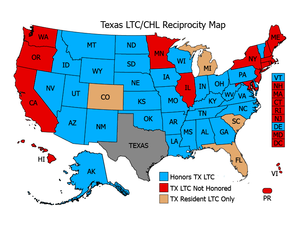NEED TO KNOW:
What is concealed carry reciprocity in USA??
You would visit the Department of Public Safety under LTC agreements with other states (here). This will better clarify which states honor the Texas LTC and what special requirements that state include or exclude if you carry in their state. All licenses that are recognized or honored by Texas are listed either as reciprocal or unilateral proclamation.
If I am licensed in Texas, can I carry my concealed handgun in another state?
Having a Texas license to carry does not allow you to carry a concealed handgun in another state, UNLESS that state recognizes the Texas LTC permit. Visit that state’s website that you plan to either enter or pass through to find out what guidelines are acceptable to that state’s rules and regulations. They definitely differ state to state and you never want to guess.
Why does Texas recognize some handgun licenses where that state does not recognize the Texas LTC permit?
Under the Texas statute, Texas may recognize another state’s license if their license meets minimal criteria for Texas regulations. The Texas Attorney General will evaluate each state’s handgun licensing program to determine where statutory reciprocity requirements are met to Texas standards. Upon recommendation of the Texas Attorney General, the Governor of Texas will issue a proclamation or sign a reciprocity agreement recognizing a license to carry license issued by another state.
The Second Amendment?
The Second Amendment of the United States Constitution provides the right to bear arms, but gun owners must still abide by laws regulating that right. State laws can cover whether — and how — a person may carry their firearms in public, whether they may bring their guns across state lines, and the conditions under which their firearms may be confiscated by law enforcement due to public safety concerns. Prospective gun owners may also be affected by regulations regarding the newer category of “ghost guns.”
Concealed carry vs open carry
“Concealed carry” refers to laws permitting people to possess a firearm in public but out of public view. In 2021, 33 states, and Washington, DC allow people to carry a concealed firearm if they have a state permit. Seventeen states place no restriction on carrying a concealed firearm.
“Open carry,” in contrast, refers to bearing visible firearms in public places. You must be aware of the term “visible” in each state.
In 2021, 42 states allow for open carry of some or all firearms. However, thee states — California, Florida, and Illinois —plus Washington, DC generally prohibit people from openly carrying firearms in public. New York and South Carolina prohibit openly carrying handguns but not long guns. Massachusetts, Minnesota, and New Jersey prohibit openly carrying long guns but not handguns. In the remaining states, people are allowed to openly carry firearms, although some states require permits or licenses.
Crossing state lines with guns
There are no federal laws restricting people from transporting legally acquired firearms across state lines for lawful purposes — unless they are prohibited from owning guns. But crossing state lines with a firearm is difficult due to differences in state gun laws.
Each state decides whether it will recognize gun permits issued from other states. Some states have entered into reciprocity agreements to recognize concealed carry permits from other states. Others — such as California, New York, and Maryland — do not honor other states’ concealed carry permits, effectively banning handguns by non-residents.
